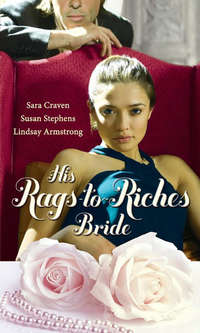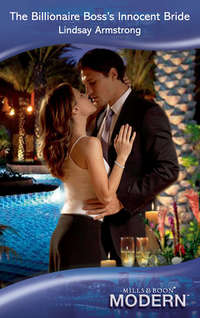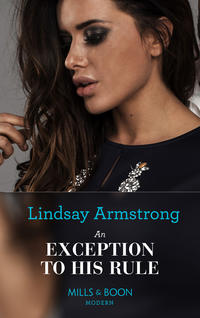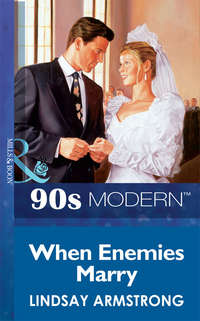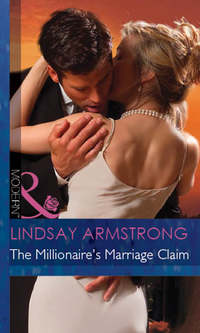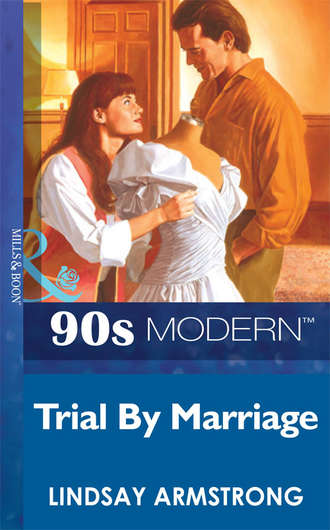
Полная версия
Trial By Marriage

Table of Contents
Cover Page
Excerpt
About the Author
Title Page
Chapter One
Chapter Two
Chapter Three
Chapter Four
Chapter Five
Chapter Six
Chapter Seven
Chapter Eight
Chapter Nine
Chapter Ten
Copyright
“You look less like aborn-and-bredschoolmarm than youdid this morning.”
Cliff’s gaze rested on her loose hair that had a tendency to be full and wayward when unconfined.
A tinge of color stole into Sarah’s cheeks, but she forced herself to say coolly, “Flattery will get you nowhere, Mr. Wyatt. I adjusted to not being a raving beauty years ago.”
LINDSAY ARMSTRONG
was born in South Africa but now lives in Australia with her New Zealand-born husband and their five children. They have lived in nearly every state of Australia and tried their hand at some unusual—for them—occupations, such as farming and horse training—all grist to the mill for a writer! Lindsay started writing romances when their youngest child began school and she was left feeling at a loose end. She is still doing it and loving it.
Trial By Marriage
Lindsay Armstrong

www.millsandboon.co.uk
CHAPTER ONE
‘HOW do you do, Ms Sutherland? Sit down, please.’
Sarah Sutherland hesitated briefly and blinked a couple of times. She’d just been introduced to Cliff Wyatt and found the experience a little breathtaking. So she sat in front of the old oak desk, unable to think of anything to say, and waited for him to continue.
He did, after a slight pause, during which she felt as if every detail of her person had been thoroughly scrutinised. He said, directing his gaze back to her rather delicate oval face dominated by a pair of horn- rimmed spectacles, ‘As you know I’ve taken over Edgeleigh Station and, as you’ve probably divined, a few changes will need to be made. A combination of drought, low beef prices, old-fashioned methods and so on have seen the property run at a loss lately so some economies are required. Therefore, can you give me three good reasons for keeping you on?’
Sarah stared at Cliff Wyatt with widening eyes—he was not sitting as she was now but resting his tall frame negligently against a window-frame behind his chair and he was probably, she thought, still a bit dazedly, the best-looking man she’d seen for years. He had thick, dark hair, dark eyes, good-looking features with a faintly olive skin, a well-cut mouth and the kind of physique that would have done an athlete proud— very wide shoulders, narrow hips, long legs and he had to be at least six feet six.
And second impressions, she realised, reinforced his good looks, because there was an aura about him, in his impeccable yellow Lacoste shirt and beautifully tailored khaki trousers, of raw power combined with sophistication, the aura of a man you would be foolish to tangle with, of intellect, of charm if you were lucky, scorn if you weren’t. And there was little charm being directed at her at present, she decided. Rather a businesslike and indifferent manner, as indeed his question had conveyed.
She sat up straighter, remembering that question. ‘I can give you a dozen good reasons, Mr Wyatt,’ she said tartly, ‘plus another recurring dozen or so, but, if you can’t see the advantage of having a proper school and a resident teacher on a property this size and this remote, I could be wasting my time.’
He raised an eyebrow and murmured, "Spoken like a true school-marm. Well—he pulled out the chair and sat down himself ‘—let’s proceed on your as- sumption that I’m dense and a Philistine. In other words, do enlighten me. But I would just like to state that I’m all for education and my question was not based on an indifference to good schooling.’ He picked up a pen, dangled it between his long fingers and re- garded her with a sort of pensive arrogance that caused her some more annoyance.
So she said thoughtfully, "I read somewhere that it’s a grave insult to the Philistines to regard them as ignorant, uncultured and unartistic but, since you brought it up in that context and as applied to yourself, all right. The School of the Air does a won- derful job but it’s an alternative when the proper fa- cilities are not available. In this case, the facilities are already here, thanks to the care and consideration of the previous owners.’ She shot him an ironic little look from behind her horn-rimmed glasses and went on evenly, ‘I can also guarantee that all of my pupils have benefited from my personal tuition, and, if you don’t believe me, check with their parents. Of course…’ she paused and regarded Cliff Wyatt steadily ‘… if you can’t afford me, that’s another matter.’
The expression in Cliff Wyatt’s fine dark eyes didn’t change as he said musingly, ‘You’re handy with, your tongue, I see, Ms Sutherland. I always did believe school-marms were born and not made. Why…’ he paused and looked her over consideringly again, taking in her plain white cotton shirt, her jeans and boots, her lack of make-up and any sort of artifice, her glasses, her long chestnut hair worn with a fringe and tied back with a rubber band ‘… you even look like the kind of spinster that is born so admirably to the vocation. You are, I gather, a confirmed spinster?’ he added, looking fleetingly down at the papers in front of him, and continued before she could speak, ‘Ah, yes, twenty-six and unmarried, never married and never likely to be, perhaps. No, it doesn’t say that here; it’s just my intuition,’ he said gently as her mouth fell open. ‘But you wouldn’t be a bad-looking girl if you took some trouble, you know. A bit thin, a bit intense maybe—the two do often go together— but nice skin and hair and—’He stopped unhur- riedly as Sarah rose and slammed a fist on to the desk so that all his papers jumped.
Nor did he look at all perturbed as she said through her teeth, ‘How dare you? I should like nothing better than to—punch you in the mouth!’
He smiled for the first time. ‘Now that would be interesting but perhaps a little unequal. For one thing, I don’t know about picking you up with one hand but I certainly could with two so I really think we’d be better off to continue trading insults rather than blows. Do you—’he looked at her quizzically ‘—make a habit of going around offering to beat people up?’
Sarah drew a deep, shaky breath and sat down rather suddenly, as it occurred to her to wonder whether she’d gone mad. ‘No,’ she said curtly, and breathed deeply again. ‘No,’ she said again, more col- lectedly although she was still angry, ‘but I must confess that I’ve never been insulted quite like this before—do you make a habit of going around of- fering verbal abuse to all and sundry in this manner, Mr Wyatt?’
‘Not usually,’ he replied with a sudden grin and lay back in his chair. ‘I do believe the first shot in this little war was yours, however.’
‘I hesitate to contradict you,’ Sarah retorted, ‘but you immediately put me on the defensive by implying that there might be no good reason to keep the school going and then uttering offensive remarks about school-marms!’
‘That’s all?’ he murmured, but as she opened her mouth and closed it immediately he went on with only a wicked little glint in his eye, ‘As to good reasons or otherwise, may I make a couple of points? There will be no school even to argue about if Edgeleigh goes broke, so I can’t afford too many philanthropic ges- tures and I need to make some rapid decisions as the new owner and employer.’ He smiled faintly. ‘As an employer it’s handy to get to the heart of things as swiftly as possible and that’s often done best in a direct, no-nonsense manner. But now that I’ve met you, Miss Sutherland, and incidentally been told by at least three pairs of parents that you’re an excellent teacher and they don’t know what they’d do without you, as well as having seen your—impassioned stance on the subject, you may stay. For the time being.’
‘Did you… did you,’ Sarah tried again, "try to un- settle, not to mention antagonise, all your other em- ployees in your capacity as a direct, no-nonsense employer this morning, Mr Wyatt? Or was it only me?’
‘Now why should you imagine I would single you out for special treatment, Miss Sutherland?’ he countered.
‘Because of an innate aversion to spinsters such as only aggressively, unpleasantly macho men can have?’ Sarah suggested with withering scorn.
‘Dear me.’ Cliff Wyatt sat up and looked at her with lazy amusement. ‘I perceive some interesting times ahead of us, Miss Sutherland. It would be funny if we discovered we weren’t at cross purposes at all, wouldn’t it?’
‘I have no idea what you mean.’
‘I wonder?’ He shrugged. ‘In the meantime perhaps I should confine myself to running the place and you to your school. That way we might manage to…limit this conflict before it gets out of hand. I take it you are going to stay?’ He looked at her quizzically again.
Sarah bit her lip and tried to stop herself but rarely had her emotions been so turbulent and she heard herself say caustically, ‘I guess so but I shall certainly do all in my power to stay out of your way.’
‘Good.’ He stood up. ‘You’ll have two new pupils, incidentally.’
‘Oh?’
‘My sister’s children. She’ll be living here with me for the time being. She and her husband have split up. They’re six and seven. Would you care to be in- troduced now or would you like time to calm down and wrest your thoughts from the frustrations of ag- gressively, unpleasantly macho men?’
Sarah’s lips parted and her eyes sparked danger- ously behind her glasses but as she opened her mouth to speak the door flew open and four people entered the study.
‘Well, that takes care of that,’ Cliff Wyatt mur- mured. ‘Miss Sutherland, may I introduce you to my sister Amy, my niece and nephew, Sally and Ben, and Wendy Wilson? Amy, this is… Sarah, I believe, Sutherland, the schoolteacher.’
The next few minutes were confused but Sarah was conscious of several overriding impressions—that Amy Weston and Wendy Wilson, who was apparently her best friend, were both glossy, beautifully groomed and clothed girls who couldn’t have looked more out of place on a cattle station if they’d tried in their de- signer gear, with their long, painted nails, flimsy sandals and expertly applied make-up. They were also striking contrasts, with Amy being a delicate honey- blonde, about five feet two, while Wendy was dark, taller with a stunning figure and beautiful yet curi- ously worldly green eyes.
Sally and Ben were both fair and blue-eyed like their mother, but, whereas Sally hung back shyly, Ben caused Sarah to smile inwardly as she recognised all the signs of an energetic, dare-devil, naughty-as-they- come little boy.
And once the rather confused greetings had taken place Amy said, ‘Well, thank heavens there’s a school, but honestly, Cliff, this place is unbelievable! The house is archaic and there are workmen everywhere, and it’s so…’ She gestured helplessly. ‘It’s… We might as well be stuck out beyond the black stump! I didn’t realise it was this far away, and this bush,’ she said intensely.
‘But I warned you, Amy,’ Cliff Wyatt said im- patiently. ‘Although the house will be finished shortly and there are all sorts of mod cons going in. Besides which you have a housekeeper so you won’t really have to lift a finger, little though you’re capable of it,’ he said drily, and added, ‘Tell me this, would you rather have stayed, perhaps languished is a better word, alone in Brisbane since you tell me you have no intention of going back to Coorilla?’
Amy disregarded the insults entirely and looked wistful. ‘At least I could go shopping in Brisbane. And I’ve just met the housekeeper, Cliff,’ she added with more spirit. ‘She… well, I’m lost for words!’
Wendy Wilson stirred. ‘She’s probably got a heart of gold underneath that mountainous frame and peculiar—er—manner,’ she suggested in a husky, oddly sexy voice.
‘She has,’ Sarah said.
All eyes switched to her and it interested Sarah to note that it was Wendy, not Amy, who drawled, ‘You could probably help us out a bit, Miss Sutherland. As you see we rather feel like fish out of water at the moment. Would you mind… helping us to find our feet among the locals a bit?’
‘Not at all,’ Sarah said although she knew that most of the locals would view both girls with the utmost suspicion, possibly for a good long time. She also started to feel annoyed again because the other girl was assessing her quite openly and contriving to make her feel aware that she was neither groomed nor glossy as well as very much an employee.
‘Then that’s settled,’ Cliff Wyatt said firmly. ‘Take ‘em away if you wouldn’t mind, Miss Sutherland; I have enough to do as it is. Oh, I’d like to check the schoolhouse out, though, and all the facilities you’re so proud of… uh, say around four this afternoon? I’ll meet you there.’ And he turned away and picked up the phone.
‘Cliff can be impossible at times,’ Amy said disconsolately.
They were in the huge homestead kitchen where Sarah had led them. Edgeleigh homestead was a rather lovely if dilapidated example of Queensland colonial architecture, with spacious, high-ceilinged rooms, deep verandas running around it and a steep green roof. Because she’d become friends with the previous owners, Sarah knew the house well and she was re- lieved to see that the mod cons Cliff Wyatt had men- tioned applied only to bathrooms and the kitchen and that the rest of the house was being restored to its former glory, with fresh paint and repairs being made in character with the style of the period.
‘Cliff is in the position of being able to do as he likes,’ Wendy Wilson said a shade drily. ‘And you have to admit you’d have been miserable on your own in Brisbane, darling.’
‘I suppose so.’ Tears sparkled momentarily on Amy’s lashes then she sniffed resolutely. ‘Are you sure you can only stay for a week, though, Wendy? This place—’ she looked around ‘—well, I’ve got the feeling it’s going to defeat me.’
‘I like it!’ Ben pronounced.
Wendy looked around thoughtfully. ‘Perhaps I can squeeze in another week. Well, Miss Sutherland, the housekeeper who gave Amy such a fright appears to have gone walkabout.’
‘Do call me Sarah,’ Sarah murmured. ‘Mrs Tibbs will have gone to collect the milk; she always does at this time. Would you like to come and see the schoolhouse?’
‘I don’t want to start school today!’ Ben declared.
‘Oh, there’s no chance of that,’ Sarah replied. ‘It’s Saturday.’
Several hours later Sarah sat on the front steps of her very basic wooden cottage that adjoined the school- house and watched the Land Rover, with Wendy Wilson at the wheel, drive away. She’d not only given Wendy, Amy and co. a tour of the schoolhouse but had borrowed one of the property vehicles so that she could introduce them to the wives and show them the mustering yards, the horse paddocks, the machinery shed and so on. Whether it had been a success, whether she had accomplished what Cliff Wyatt had expected her to was debatable.
There were ten men employed permanently on Edgeleigh, four of them with wives who between them provided her twelve regular pupils, and there was Mrs Tibbs, an institution on the property. She was a huge, formidable woman who could rope a calf single- handedly yet had the lightest hand for making pastry and, although no one called her anything but Mrs Tibbs, the whereabouts of Mr Tibbs remained a mystery. They’d finally run her to ground at the cottage of Jean Lawson, wife of the station foreman, and Sarah had attempted to establish some sort of bridge between the newcomers and the two old hands, but although Jean Lawson had tried her hardest Mrs Tibbs had remained inscrutable and unforth- coming—although she had, Sarah had noticed, al- lowed her gaze to rest on the children, particularly Sally, several times. Mrs Tibbs had a very soft spot for children.
Well, I can’t do any more, Sarah thought, and shook her head ruefully. As a matter of fact he’s jolly lucky I did as much after what he said to me, let alone Ms Wendy Wilson’s patronising ways…
And she fell to thinking about her new employer. He would be in his middle thirties, she judged, and immediately thought bitterly, Why didn’t I make some comment about him not being married, which he ob- viously isn’t? In fact I’ve been told he isn’t by everyone who got into such a flutter when he bought the place!
She grimaced then propped her chin on her hands and let her mind roam backwards. As soon as it was known that Edgeleigh had changed hands much speculation had taken place. Once it had become known that the wealthy Wyatt family had bought it, the speculation had become tinged with reverence. Sarah herself had had no knowledge of them but then she was not even a Queenslander, let alone an expert on the great pastoral families of the state. But she’d swiftly become apprised of the fact that they owned other stations—Coorilla had been mentioned often in the context of being a showplace and the Wyatts’ home base—and it had been said that if anyone could turn Edgeleigh’s fortunes around Cliff Wyatt was the one.
‘I wouldn’t be surprised,’ she murmured drily to herself; ‘but that doesn’t mean to say he’s anything but a thoroughly unpleasant macho type of man.’ Then she sighed and looked around. Edgeleigh had been her home for the past year; situated in western Queensland, it spanned thousands of acres and ran thousands of head of cattle. It was intensely hot in summer and could be brisk and chilly in winter, with cold nights. It was not the most beautiful place on earth unless you appreciated the often dry and arid countryside and to do that you needed a fairly subtle eye for colour. The greens weren’t lush and brilliant and sandy brown predominated but there were shades of it that were sometimes closer to ochre, sometimes blindingly pale, and shades of blue to the sky that could be breathtaking. There was always an unlimited feeling of space. And in spring there was the unbe- lievable glory of the wild flowers that bloomed and cloaked the earth in blues and yellows, purples and pinks…
But it wasn’t only the colours and space Sarah had become addicted to, it was the freedom of having her own school, she had to acknowledge, and she caught her breath suddenly, knowing it would be an awful wrench to leave.
At twenty-six, she had no steady relationship with a man, it was true, but she rarely felt it as a lack in her life. For one thing she had reason to be somewhat cynical about what went on between men and women; for another she was passionate about teaching and knowledge—for yet another she was heavily into cre- ative arts such as papier mûché, rug-making, de- coupage et cetera, she was a fine seamstress, a creative cook, she loved growing things and grew her own herbs and anything else she could get to grow in pots, and she was the one who always got landed with any sick or stray wildlife such as orphaned baby kanga- roos or koalas, and birds with broken wings.
Consequently her cottage was a riot of colour from her artistic and potted gardening endeavours—indeed they spilled over into the schoolhouse next door—and more often than not there was an inquisitive lame joey about the place, and she rarely had a free moment.
Yes, very hard to leave, she mused with a sigh, and thought of “her” school. Although the permanent number of pupils was twelve currently, she had a wandering population that sometimes doubled the ranks, of children and even occasionally adults from the mostly aboriginal pool of stockmen and ringers who came and went like the seasons. She never turned anyone away even when she knew they’d be here today gone tomorrow, and it was amazing how many of those children turned up again and again. But for her twelve permanents, she was more than just the teacher; she was the confidante of their parents, often the babysitter, sometimes the relief nurse, the adviser who knew a bit about the big cities some of them had never seen, and lots more.
At present she was even the dressmaker, she thought with a wry little smile as she got up and wandered inside towards an improvised dressmaker’s dummy, drew the protective sheet aside and contemplated the wedding-dress she was making for Cindy Lawson, just eighteen, about to be married to a stockman from a neighbouring station and determined to be married in a dress that would be remembered for years on Edgeleigh. It had everything, this dress, or would have when finished, Sarah thought ruefully. The basic white taffeta was in the process of being embellished with lace, with sequins and pearl beads, with ruffles and frills and bows, and it had underskirts of billowing net. And if I don’t take a stand soon, poor Cindy will be so buried by it all, we won’t even see her, she re- flected. But at least it is all nicely sewn, she thought as she fingered a sleeve absently, and found her mind for some reason of its own returning to Cliff Wyatt— and the uncomfortable feeling she had that he’d all too readily realised his first effect on her. And that a couple of his subsequent obscure remarks had been subtle allusions to it.
Which makes him no more likeable, she thought, then glanced at her watch and decided to spend the next hour until four o’clock making sure the school- house was in tip-top condition.
It was a waste of time. By four-thirty he hadn’t ap- peared, by five-thirty she decided he wasn’t going to appear although she hadn’t hung around the school house all that time, but at six she closed her front door firmly against the rising chill of an autumn dusk. She prepared a chicken casserole using herbs, bacon and mushrooms, indulged herself in a rare treat—a glass of wine to soothe her feeling of being ill-used by an arrogant man—put a compact disc of Bach on to the player to help the wine along, pulled the rubber band out of her hair and ran her fingers through it, and started to sew the last, the very last, she told herself firmly, of the pearl beads on to Cindy Lawson’s wedding-dress while her casserole cooked.
So engrossed did she become in the delicate work that when a knock sounded on her door she called absently to come in, thinking it must be one of her pupils or their parents. So she got the surprise of her life when a light, lazy voice she remembered all too well said with reverence, ‘Hallelujah! Is it possible I’ve done you a grave injustice, Miss Sutherland?’
She swung round from the dressmaker’s dummy convulsively to see Cliff Wyatt standing just inside the front door, his dark gaze riveted upon the wedding-dress. ‘What a—concoction!’ he added wryly, and drew his gaze from it to her, standing in her socks. ‘But you know’ he mused as he took in her loose hair and the lovely pink and gold quilted sleeveless jacket she’d put on for warmth, ‘I could picture you in something… simpler?’
Sarah closed her mouth with a click, bit the cotton thread and put her needle carefully into a pin-cushion before she said arctically, ‘It’s not mine, Mr Wyatt, so neither did you do me an injustice nor are any as- persions you care to cast at my taste in fashion going to do anything other than bounce harmlessly off me.’
‘My apologies,’ he said gravely. ‘So you make wedding-dresses in your spare time?’
‘No, I don’t,’ she said crossly. ‘Well, I am doing this one in my spare time but it’s the first. It’s Cindy Lawson’s. You may have noticed that this part of the world is not densely populated by dressmakers so I… well, offered to help out.’


